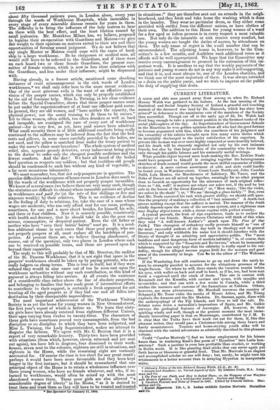CURRENT LITERATURE.
Sclater notes down a naturalist's impressions of Spain, and Mr. Geikie an • Obituary Notice of the late Richard Hussey Walsh, LL.D., &v. tee.
t Sunsets and Sunshine ; or, Varied Aspects of Life. By Erskine Neale, M.A. Long- man and Co. $ The Foes of our Faith, and How to Defeat Them; or, the Weapons of our Warfare with Modern inoldelity. By a well-known Author. Dorton and Hodge. § Vacation Tourists and Notes of Travel in 1861. Edited by Francis Galton. Mae.
charmed with the varied adventures so admirably described in this pleasant volume.
Could "Carolus Merivale "II find no better employment for his leisure hours than in rendering Keat's fine poem of "Hyperion" into Latin hex- ameters? Such a pastime is even less profitable than crochet, or working in Berlin wools. It is like planting dead sticks that can never again put forth leaves or blossoms or grateful fruit. That Mr. Merivale is an elegant and accomplished scholar no one will deny ; but, surely, he might turn his attainments to a better account than in arraying Hyperion in masquerade attire. A Goon and able man passed away from among us when Dr. Richard Hussey Walsh was gathered to his fathers. At the last meeting of the Statistical and Social Inquiry Society of Ireland a graceful and touching memoir of the deceased was read by Dr. Hancock, which has since been printed* in deference to the unanimous vote of the members of the Society then assembled. Though cut off at the early age of 36, Dr. Walsh had lived long enough to take a prominent position in the foremost ranks of the social philosophers of the day. As Superintendent of Government Schools in the Mauritius he won golden opinions from all who had the good fortune to become acquainted with him, while the soundness of his judgment and the versatility of his talents brought upon him many extra duties which he invariably discharged to the entire satisfaction of his superiors. In private life no man was ever more highly respected or more heartily beloved, and his death will be sincerely regretted not only by his own intimate friends, but also by that large section of the community who knew him only through his public labours and his eminently useful writings.
What possible object beyond mere book-making the Rev. Erskine Neale could have proposed to himself in stringing together his heterogeneous sketches of death seenest would puzzle the most skilful expounder of riddles to discover. A more curious assortment of odds and ends could hardly be found even in Wardour-street. Count Louis Batthyani, John Camden Neild, Lola Montes, the Marchioness of Salisbury, Mr. Vance, and the Duke of Dorset are all mixed up together, seemingly for no other purpose than to furnish an opportunity for the utterance of such original reflec- tions as "Ah, well! it matters not where our ashes rest, if the soul be but safe in the bosom of the Great Eternal ;" or, " How many, 'like the violet, are safest in the shade"; or, " We see through a glass darkly." But, even had Mr. Neale executed his task with greater ability, we should still ques- tion the propriety of makings collection of "last moments." A death-bed proves nothing except that the sufferer is mortal. The manner of the death chiefly depends upon the state of the nervous system, and a righteous man may display abject terror, while a sinner expires with perfect serenity.
A cynical proverb, the fruit of ripe experience, leads us to eschew the advocacy of our friends. Many sincere Christians will think of this when they read "A well-known Author's" attack upon The Foes of Our Faith.$ This champion of orthodoxy coolly presents himself as "one of the most successful authors of the day both in theology and in general literature," and only withholds his name lest it should interfere with the liberty of thought of an admiring and appreciative public. The "most insidious and most dangerous form of modern infidelity " is, of course, that which is supported by the "Essayists and Reviewers," whom he incessantly belabours. We can only hope that his celebrity is really equal to his cre- dulity, though his alleged success argues little for the acumen and good sense of the community at large. Can to be the editor of "The Welcome Guest" ?
If the Wandering Jew still continues to go up and down the earth he must be strangely puzzled to account for the ubiquitous presence of the Anglo-Saxon. Go where he will, there stands the vacation tourist before his eyes, with wallet on back and staff in hand, as if he, too, had been sent forth a vagabond until the crack of doom. This one is content with






























 Previous page
Previous page